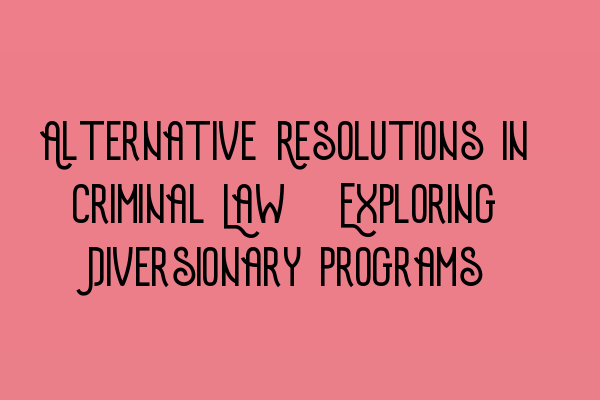Alternative Resolutions in Criminal Law: Exploring Diversionary Programs
In the realm of criminal law, there is a growing recognition that not all cases need to follow the traditional route of arrest, prosecution, and sentencing. Alternative resolutions, such as diversionary programs, offer a way to address the underlying issues that may have led to criminal behavior, while also providing an opportunity for rehabilitation and avoiding the potentially detrimental consequences of a criminal record.
What are Diversionary Programs?
Diversionary programs are initiatives designed to divert individuals away from the formal criminal justice system and provide them with an alternative path towards resolution. These programs aim to address the root causes of criminal behavior, such as substance abuse or mental health issues, through various interventions and support services.
One such program is drug diversion, which focuses on providing substance abuse treatment rather than incarceration for individuals charged with drug-related offenses. By offering rehabilitation and support, these programs aim to assist individuals in overcoming their addiction and reintegrating into society as law-abiding citizens.
Another commonly used diversionary program is mental health diversion. This program recognizes that individuals with mental health conditions often become entangled in the criminal justice system due to their symptoms or lack of access to appropriate treatment. By diverting these individuals towards mental health treatment and support, the program aims to address the underlying causes of their criminal behavior and prevent future offenses.
The Benefits of Diversionary Programs
Diversionary programs offer a range of benefits for both individuals and society as a whole.
For individuals, these programs present an opportunity to address the underlying issues that may have contributed to their criminal behavior. By focusing on rehabilitation rather than punishment, individuals can access the support and resources they need to make positive changes in their lives. This can lead to reduced rates of recidivism and a higher likelihood of successful reintegration into society.
From a societal perspective, diversionary programs offer a cost-effective alternative to traditional criminal justice processes. Incarceration can place a significant financial burden on taxpayers, while also potentially exacerbating the cycle of criminality. Diversionary programs, on the other hand, provide an opportunity for early intervention and preventative measures, ultimately leading to safer communities.
Challenges and Considerations
While diversionary programs have proven to be effective in many cases, there are challenges and considerations to be taken into account.
Firstly, successful diversion relies on adequate funding and resources. Without sufficient support, these programs may not have the capacity to effectively address the needs of all individuals eligible for diversion. It is therefore crucial for governments and stakeholders to invest in the development and implementation of robust diversionary programs.
Secondly, the effectiveness of diversionary programs relies on collaboration between various stakeholders, including law enforcement, prosecutors, defense attorneys, and treatment providers. Clear communication and cooperation are essential for the smooth functioning of these initiatives.
Lastly, it is important to continually evaluate and improve diversionary programs based on evidence and data. Monitoring outcomes and making adjustments based on feedback ensures that these initiatives remain effective and responsive to the evolving needs of individuals involved in the criminal justice system.
Conclusion
Diversionary programs offer a promising alternative to the conventional criminal justice system, providing individuals with the opportunity to address the root causes of their criminal behavior and obtain the necessary support for rehabilitation. These programs not only benefit individuals but also society as a whole, leading to safer communities and reduced rates of recidivism.
If you want to learn more about criminal law and practice in the UK, check out our related articles:
- SQE 1 Practice Exam Questions
- SQE 1 Practice Mocks FLK1 FLK2
- SQE 2 Preparation Courses
- SQE 1 Preparation Courses
- SRA SQE Exam Dates
At SQE Criminal Law & Practice Law UK, we are dedicated to providing comprehensive resources and education to aspiring legal professionals. Stay informed and excel in your legal career with our expert guidance.
